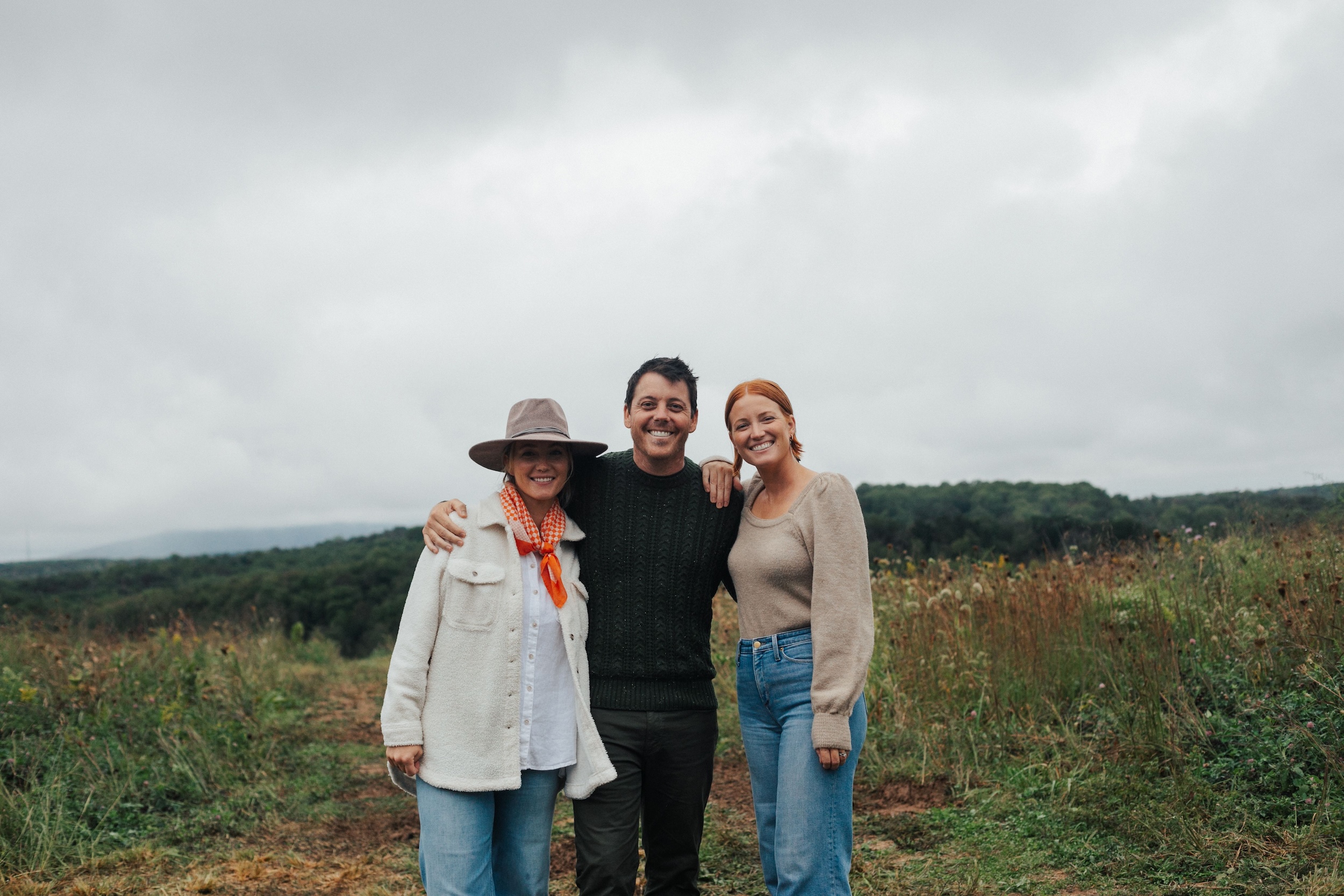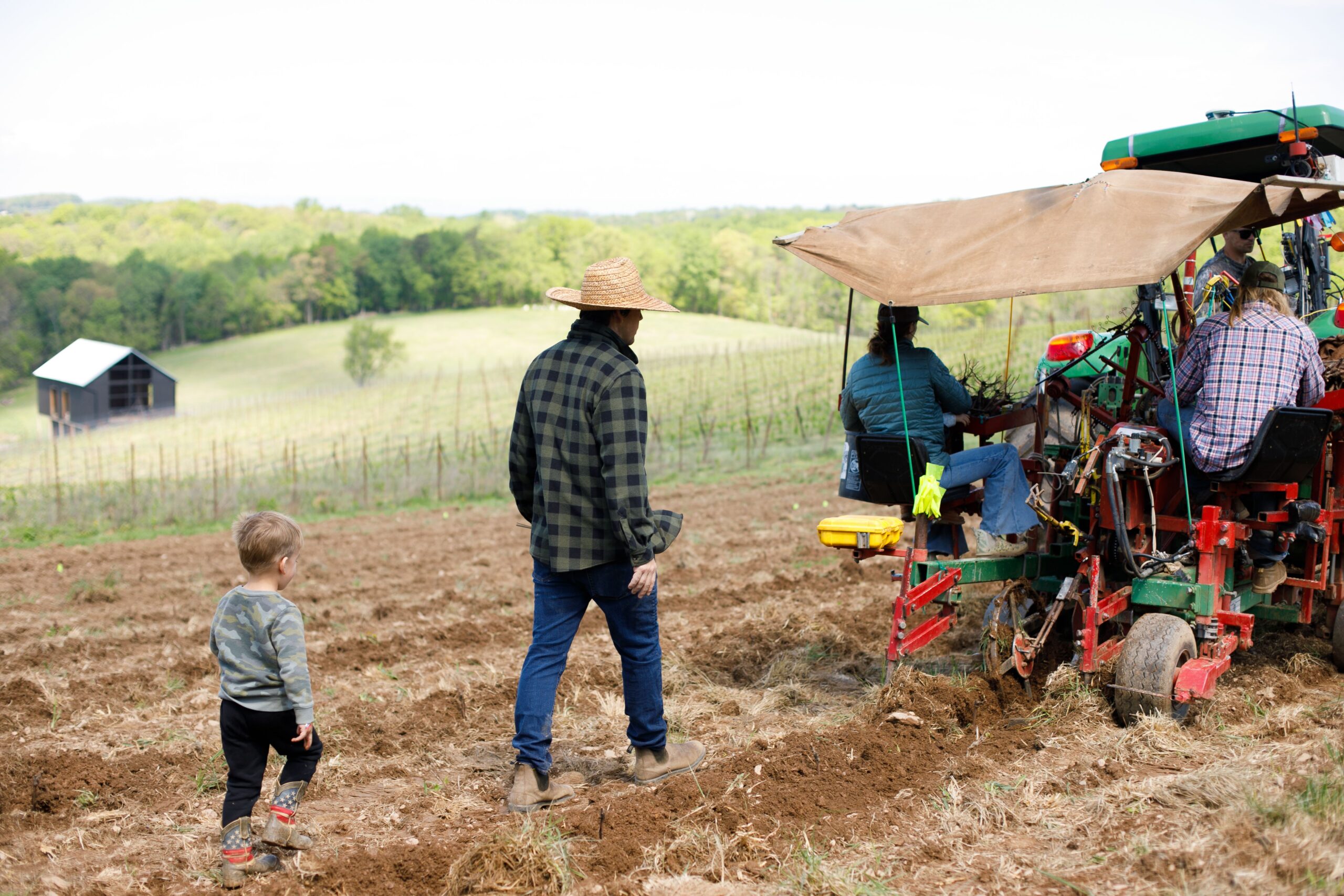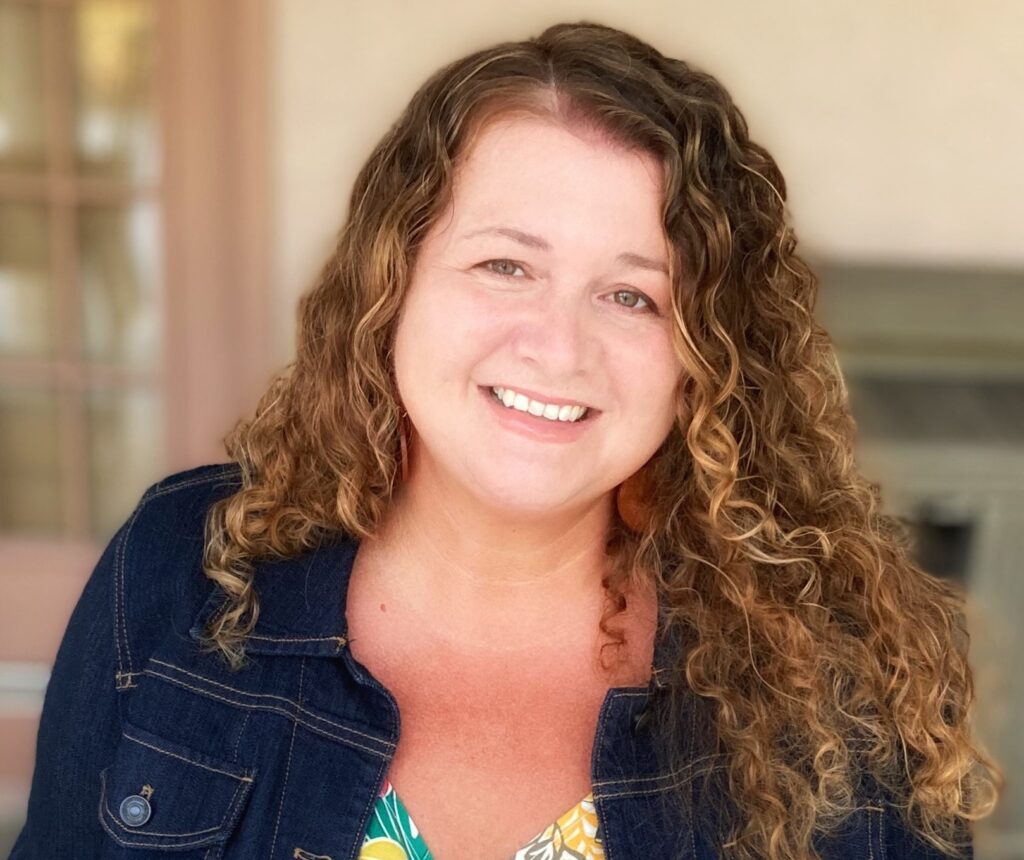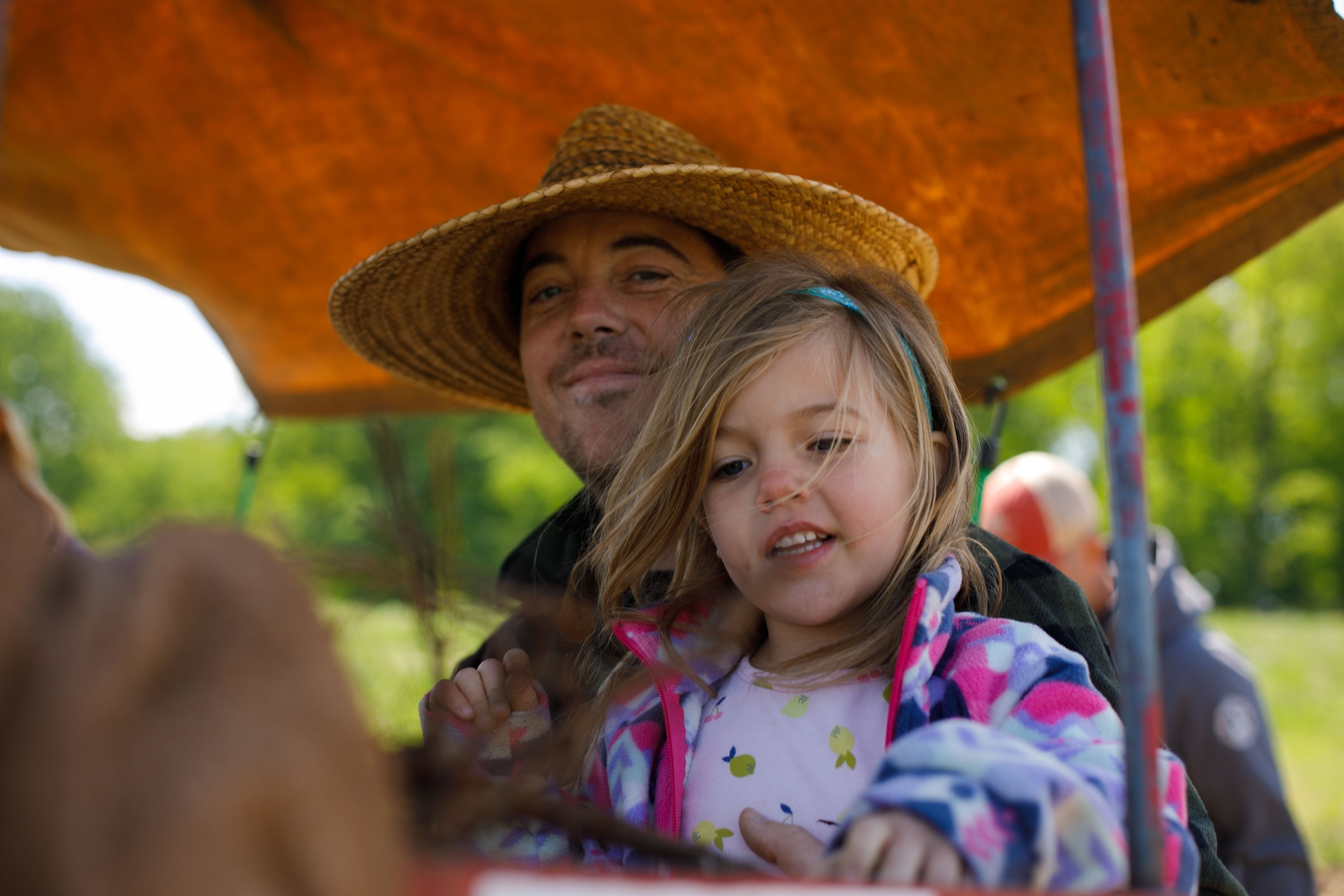NORTH STARS:
Production & Consumption
Water Management
Wildlife & Ecosystems
“We have three kids. I don’t want to miss their life. I know they’re loved and cared for, with or without me, but I’m their dad.“
Looking out over the 117 acres of wild hillside shadowed by the Appalachian Mountains, siblings Drew Baker, Ashli Johnson, and Lisa Hinton dreamed of Burnt Hill Farm, a winery rooted in the lessons dating back to the Romans where grapevines crawled mountainous terrain, succeeding where other crops failed. Visions of a tasting parlor with a grand crush pad front porch, estate wine flights paired with snacks from the bountiful gardens throughout the farm, sharing bottles of wine around a campfire, and sleeping out under the stars danced in their heads.
In 2010, the siblings left their jobs to go all in and convert the Maryland farm they grew up on into a winery rather than sell it. By 2016, their “save the farm” project, Old Westminster Winery, gained distribution in big markets like California and New York, opened a tasting room to the public, and cracked the top 101 wineries in America—their wine project was crushing it. they itched to start something new that blended their love of the land, belief in regenerative farming, and respect for quality food and wine grown and harvested by hand. Burnt Hill Farm started to take shape in 2016 as they rotated cover crops and built a foundation for their “polyculture paradise.”

Drew with his sisters on the property. Image courtesy of Burnt Hill Farm
Everything clicked along until Baker attended a natural wine festival, Third Coast Soif, held in Chicago in 2022. Baker, normally a live wire, felt sapped of energy. He looked for ways to sneak away and rest. Back home he continued to grow weaker until Sunday evening with the prospect of another week of struggling, he went to the urgent care down the street. They couldn’t find anything. Until they looked at his blood. The diagnosis solidified after a visit to the emergency room and then an oncologist…Acute Myeloid Leukemia (AML).
This type of insidious cancer accounts for 1.1% of all cancer cases in the U.S., according to the American Cancer Society. The five-year survival rate for adults with AML in the U.S. is 29.5%. Baker’s version had broken the blood-brain barrier, further complicating treatment.
He checked into Johns Hopkins Hospital and began induction, the painful process of killing every cell in your system. For 33 days, Baker and his doctors battled the leukemia flowing everywhere in his body, including in his rare case, his central nervous system.
Terrified, he clung to thoughts of his family.

Drew in the vineyard planting vines with his kids. Image courtesy of Burnt Hill Farm
“We have three kids. I don’t want to miss their life. I know they’re loved and cared for, with or without me, but I’m their dad,” Baker said.
Over the next few months, doctors purged his body’s poisoned foundation, flushing the cancer from his system through a painful cocktail of treatments, readying him for his first transplant. His youngest sister Ashley donated the bone marrow, resetting his immune system.
The cancer returned six months later in March 2023 and again infiltrated his central nervous system. Baker started treatment again, but remission remained elusive.
After several Hail Mary experimental treatments, one worked, but he needed another transplant immediately.
“We have lots of medication to kill things, but your body has to do the right thing, or it’s just a matter of time,” Baker said. His sister Lisa stepped in with her bone marrow this time.
“We’re not just business partners. I literally have both of my sisters’ DNA. And if not for it, I’d be dead.”
Back in remission, plans for Burnt Hill Farm came off life support. The high elevation and Appalachian Mountains’ diverse topography lent itself to prodigious grapevines but also inspired the siblings to want to bottle their own experiences cooking over the campfire and drinking wine amid the verdant landscape. In 2024, the zoning Baker championed for immersive farm stays since 2018, became a reality. This would provide another revenue stream to support the operation. Visitors would connect with the farm and all its bounty, waking up to the sound of cows and going to sleep under the shadow of the Blue Ridge Mountains.
Soon 10 bothies—small huts found in remote mountainous areas of Scotland, Northern England, and Wales—will grace the landscape. Immersive farm stays will reflect the qualities and styles of the wine they produce, rural and rustic coupled with luxury elements. Guests can enjoy acres of mature forests that back into the state park, wander rows of grapevines, pick fruit in the orchard, and eat and drink of the land in the way Baker dreamed about before cancer paused his life.
As the land, diminished from centuries of timber burning for charcoal, soap making, and fertilizer, regains its vitality under the siblings’ care—Baker’s body shows signs of regaining its vigor. Broken from so much treatment, petty torments still plague him daily, while monthly he submits to painful preventative chemotherapy injected through a port installed in the top of his head.
“I have grieved my death many times along this cancer journey, fully convinced I wouldn’t be alive at this moment,” Baker said. “The past couple of years have been so hard for my wife Casey. Feeling like you’re an inch away from death in bed for months is objectively horrible, and everyone can see it, but trying to take care of three kids, pay the bills, keep everything together, and take care of that person, which was me, is also really grueling. She has done it with a smile and grace.”
The table is set for a delicious vintage. They just harvested their first pinot for Blanc de Noir, slated as their inaugural Burnt Hill wine next spring. Fermented and aged in Ashwood barrels, the vessel represents another chapter of the farm story. The trees afflicted by the emerald ash borer (an insect that will make Ashwood trees extinct in our lifetime) began to collapse. Rather than watching them die over the next decade, Baker and his sisters elected to harvest and upcycle them into wine barrels, imbuing a nuanced flavor of this place for years to come.
Overlooking the Appalachian Mountains to the west, Baker feels the energy coursing through this land, matching his renewed vigor. “It’s more than just a rocky hillside we selected for its topography and potential as a Grand Cru vineyard, capable of producing great American wines. It’s more than my home, where I’m blessed to live and raise a family,” he said. “Every day, I fall in love with it more.”

Carrie Honaker is a Florida-based food and travel writer who is not sure where she will land next, but it will involve messy eating, a spicy Tempranillo, and finding the local farmers market. She has hauled oyster cages off the Forgotten Coast of Florida, harvested indigenous crops with the Abenaki Tribe in Vermont, learned to make beef patties from a Jamaican auntie, made Guavaberry Liqueur with a 7th generation distiller on St. Maarten, and stomped cacao pods in Grenada. Follow Carrie on IG @writeonhonaker.



